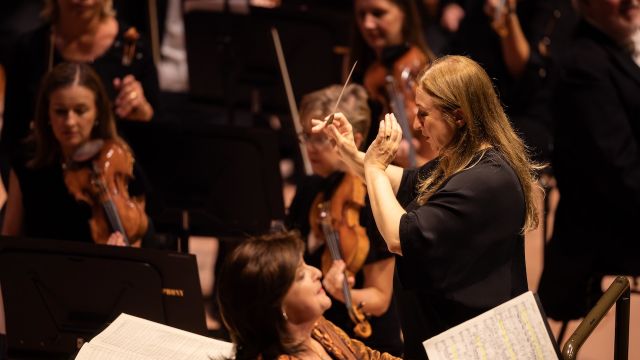Simone Young Conducts Gurrelieder
Arnold Schoenberg was still a teenager and much inspired by Mahler and Strauss when he started composing this supernatural oratorio, initially for just a piano and two singers.
Now in its first SSO staging, Simone Young conducts a massive orchestra of 140 musicians with six soloists and a further 285 choristers standing by for Part III. This late Romantic mega-work was much as Schoenberg finally conceived it for the premiere in Vienna in 2013.
Then he promptly rejected such early music of his and turned instead to a future of atonality and twelve-note serialism.

Gurrelieder is a based on the Danish medieval legend of King Waldemar and his adored mistress Tove, who is murdered by his jealous Queen, leaving Waldemar cursing God to the skies. For his pains, the King and his ghostly retainers are forever doomed to ride the nights trying to find the elusive Tove.
The oratorio starts with beautiful delicacy as Tove (Ricarda Merbeth) and Waldemar (a passionate Simon O’Neill) sing separately of nature awakening, but soon swells with their sexual anticipation as the King rides to consummation. In one of Gurrelieder’s odd dramaturgical leaps (with the surtitles offering a prosaic, double translation of the original 19thC poem), both quickly sink into a foreboding of death, and Queen Waldtaube (mezza soprano Deborah Humble) arrives to report on Tove’s very Gothic funeral.

In her famous song of the Wood Dove, the Queen describe its brutal end, but our enrapture in this Part I is distanced by these three roles inexplicably singing in the third person. And despite his orchestral force, Schoenberg, in this first Part at least, doesn’t yet fully realise other opportunities for a variety in melodies, light and shade.
Next, Waldemar is wildly dramatic in his threats and blasphemies to God, and suddenly the crazed King and his knights are ghosts rising from their graves for futile searching and terrifying the village characters. These observers of the nightmare are welcome arrivals. Sava Vemic brings realistic drama and wit to the amazed Peasant, as does Andrew Goodwin’s Fool who wants to stay in his grave, and Warwick Fyfe’s Speaker who ends with heralding the sunrise. This glorious pinnacle of all voices and orchestra presumably marks the other worldly bonding of Tove and Waldemar. Or the new day promise of Nature.

In its poetry and music, Gurreleider is captivating as a truly Germanic Romantic tale, with its sharp eye for Nature’s power and mysteries and for the horror and passions of humans trying to defy fate and searching for love and transcendence. It’s a mighty show from Young and the SSO, with musicians also from the Australian National Academy of Music, and the Sydney Philharmonia Choirs and the MSO and TSO Chorus.
You can still go to Denmark and see the ruins of Gurre where the historical Waldemar died in 1374.
Martin Portus
Images courtesy of Sydney Symphony Orchestra. Photographer: Dan Boud.
Subscribe to our E-Newsletter, buy our latest print edition or find a Performing Arts book at Book Nook.

